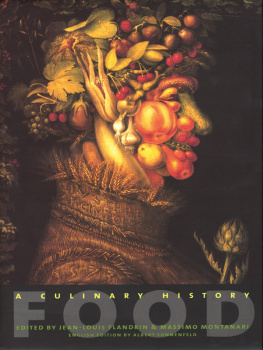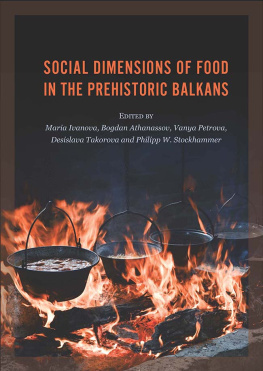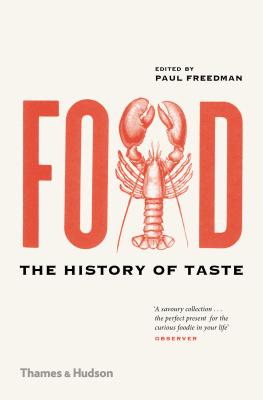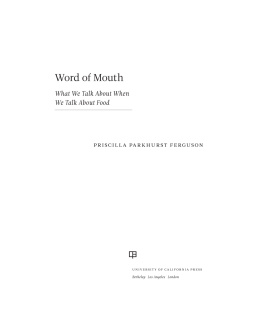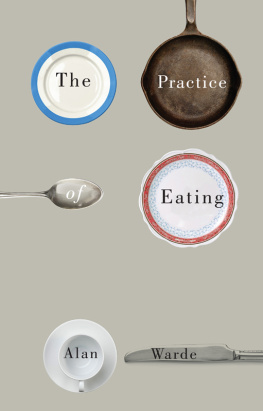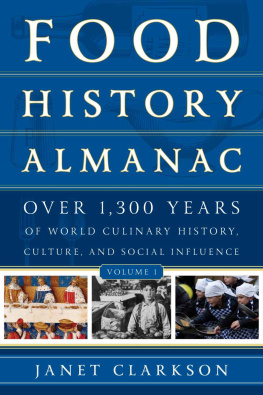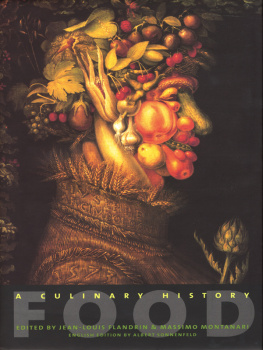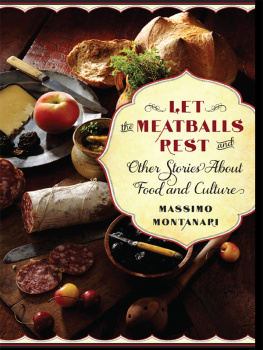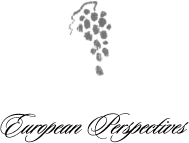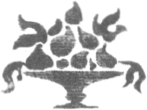Table of Contents
FOOD
Under the direction of Jean-Louis Flandrin
and Massimo Montanari
ENGLISH EDITION BY ALBERT SONNENFELD
Translated by Clarissa Botsford, Arthur Goldhammer,
Charles Lambert, Frances M. Lpez-Morillas,
and Sylvia Stevens
FOOD
A CULINARY HISTORY from ANTIQUITY to the PRESENT
COLUMBIA UNIVERSITY PRESS NEW YORK
COLUMBIA UNIVERSITY PRESS
Publishers Since 1893
NEW YORK CHICHESTER, WEST SUSSEX
cup.columbia.edu
Histoire de lalimentation Copyright 1996 Gius. Laterza & Figli, Rome, Bari/Librairie Arthme Fayard
Copyright 1999 Columbia University Press
Paperback edition, 2013
All rights reserved
E-ISBN 978-0-231-54409-2
Library of Congress Cataloging-in-Publication Data
[Histoire de lalimentation. English]
Food: a culinary history from antiquity to the present /
edited by Jean-Louis Flandrin and Massimo Montanari;
translated by Albert Sonnenfeld
p. cm. (European perspectives)
Includes bibliographical references and index.
ISBN 978-0-231-11154-6 (cloth : alk. paper)
ISBN 978-0-231-11155-3 (pbk. : alk. paper)
1. FoodHistory. 2. Food habitsHistory. I. Flandrin, Jean
Louis. II. Montanari, Massimo, 1949. III. Sonnenfeld, Albert.
IV. Title. V. Series.
TX353.H525 1999
641.309dc21
9934859
A Columbia University Press E-book.
CUP would be pleased to hear about your reading experience with this e-book at .
Designed by Linda Secondari
Illustrations by Martha Lewis
Cover image RMN - Grand Palais / Art Resource, NY
A SERIES IN SOCIAL THOUGHT AND CULTURAL CRITICISM
Lawrence D. Kritzman, Editor
European Perspectives presents outstanding books by leading European thinkers. With both classic and contemporary works, the series aims to shape the major intellectual controversies of our day and to facilitate the tasks of historical understanding.
For a complete list of books in the series, see
CONTENTS
Albert Sonnenfeld
Jean-Louis Flandrin and Massimo Montanari
Jean-Louis Flandrin
Catherine Perls
Francis Joannes
Edda Bresciani
Jean Soler
Antonella Span Giammellaro
Massimo Montanari
Marie-Claire Amouretti
Pauline Schmitt-Pantel
Massimo Vetta
Giuseppe Sassatelli
Florence Dupont
Mireille Corbier
Innocenzo Mazzini
Oddone Longo
Massimo Montanari
Massimo Montanari
Massimo Montanari
Massimo Montanari
Ewald Kislinger
Bernard Rosenberger
Miguel-ngel Motis Dolader
Massimo Montanari
Antoni Riera-Melis
Alfio Cortonesi
Franoise Desportes
Hans Conrad Peyer
Bruno Laurioux
Allen J. Grieco
Jean-Louis Flandrin
Daniela Romagnoli
Franoise Piponnier
Jean-Louis Flandrin
Michel Morineau
Alain Huetz de Lemps
Philip Hyman and Mary Hyman
Jean-Louis Flandrin
Jean-Louis Flandrin
Jean-Louis Flandrin
Hans Jurgen Teuteberg and Jean-Louis Flandrin
Yves Phaut
Jean-Robert Pitte
Giorgio Pedrocco
Alberto Capatti
Julia Csergo
Harvey A. Levenstein
Claude Fischler
Jean-Louis Flandrin and Massimo Montanari
Albert Sonnenfeld
Culinary history has moved to the front burner, joining proliferating recipe collections, cookbooks, and celebrity chef albums as hot items for our age of pluralistic cultural studies. Publication of this English-language edition of Food: A Culinary History from Antiquity to the Present could not have come at a more opportune time. Food is such a powerful dimension of our consciousness as living things, the distinguished anthropologist Sidney Mintz said, to omit it from the study of human behavior would be egregious.
The American Center for Wine, Food and the Arts, located in Napa, California, and financed by the Mondavi Winery, has broken ground for a 2001 opening. The annual scholarly Oxford University Food Conferences, organized by historian Theodore Zeldin, have long since established the legitimacy of the field in Anglo-American intellectual circles. Alan Davidsons Petits propos culinaires, the American Institute of Wine and Foods Journal of Gastronomy, and the Cornell-based review Food and Foodways provide ongoing scholarly outlets. The Oxford Book of Food is soon to appear, and Barbara Haber, director of the culinary collection of the Schlesinger Library at Radcliffe College, not complacent with her own spectacular holdings, is compiling a Web-site directory of relevant materials in other American libraries and private collections. Various foodie professional organizations now routinely appoint such learned visiting scholars as Dr. B. H. Fussell to educate their membership in historical perspectives.
Culinary history is slowly but surely entering the curriculum as a respectable academic field. Three hundred anthropologists in the United States list food studies as their specialty; courses in food and culture are increasingly widespread at the University of California-Berkeley, Emory University, and the Johns Hopkins University. There are degree-granting programs burgeoning at Boston University, Cornell University, and NewYork University, even reaching into the ever expanding cooking schools (careers in food services are at the top of job opportunities). With the popularity of historically based theme restaurants (one thinks of the historical research in the works of Apicius preceding the opening, say, of Joe Baums Forum of the Twelve Caesars), and the fashion of recherch fusion cuisine in London and the Zagat-driven cities of America, serious would-be chefs are turning to history to seek out the origins and secrets of the exotic savors of the past. An American chef could now, in theory, open an Etruscan restaurantthanks to historical research: the authenticity may not be in his blood, but it might well be in his files. Contemporary restaurant criticism, long looked to primarily for excessively personalized hyperventilation leading to a planetarium of quantified stellar ratings, is responding to Chef Mark Millers stricture: Most lack intellectual weight, because few critics have the knowledge or experience to put restaurants into a larger historical and social context. The best art, music, and theater critics provide insight that restaurant critics rarely do. But the writings of Mimi Sheraton, Raymond Sokolow, and Jeffrey Steingarten show how historically valid restaurant criticism can become. Even the daily press has moved beyond seasonal recipes and nostalgic reminiscences, enlisting the services of such erudite American food historians as Charles Perry, who might very well hold forth to devotees of the

